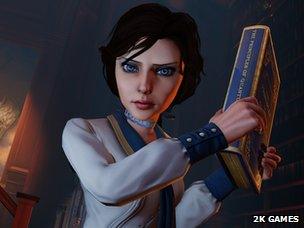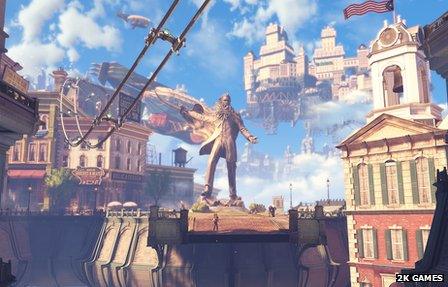Playing games with culture
- Published
BioShock Infinite creative director Ken Levine on the key to his success
Sometimes a video game is more than just a game. Especially when it is written and created by Ken Levine.
Mr Levine has been behind some of the most influential games of the past 20 years, including System Shock 2, Thief: The Dark Project and the BioShock series. Tuesday sees the release of BioShock Infinite, a successor, of sorts, to the first two games in the series.
BioShock Infinite is not a direct sequel but has much in common with its two predecessors and not just because both are first-person shooters in which combat revolves around guns and quasi-magical powers.
The original BioShock games were set in the underwater city of Rapture - a flawed utopia created and overseen by industrialist Andrew Ryan.
BioShock Infinite is set in the floating city of Columbia, - a flawed utopia overseen by religious zealot Zachary Comstock.
The parallels do not stop there. Rapture and its setting was informed by Mr Levine's interest in the objectivist philosophy of controversial US-Russian philosopher Ayn Rand.

Players are accompanied by a character called Elizabeth
The new game also tackles big themes. It's not hard to guess which one given that it is set in a floating city in the clouds where everything is supposed to be better.
"I love cultures that fall apart," Mr Levine told the BBC. "What games do really well is let you explore a world. No other medium, not books, or TV or movies, lets you at your own pace explore that world."
BioShock Infinite makes players do that exploring in the guise of Booker DeWitt, a former detective who gets the job of scouring the city to find and rescue a mysterious woman called Elizabeth. While the player controls DeWitt, Elizabeth is controlled by in-game artificial intelligence. She serves as a guide for DeWitt as well as an assistant in fire-fights and helps give the setting a properly human face.
At first glance, this does not seem to engage with the bigger issues Mr Levine is passionate about. Despite this, the game has been written so situations regularly occur in which players must make difficult decisions.
"It's that moment of confrontation where you realise you have to have a say here, you cannot walk away from it," he said.
Choices are tied to the setting and help players confront the use and abuse of religion and the actions it can be used to justify.
Although Mr Levine's works hard to add a moral dimension to gameplay and obsesses over the setting, he does not mind if people ignore or miss the point he is trying to make. Many people who played the original BioShock had no idea that it drew on Ayn Rand's philosophy.

The floating city of Columbia forms the backdrop to the game
Research suggested three types of people played the BioShock games, he said. Some, who Mr Levine calls archaeologists, immerse themselves in the setting and explore every nook and cranny. Then there are those who get enough of the story to know what is going on but don't dip too deep. Finally, there are those who just want to shoot the guns, win the fire-fights and bounce off the scenery.
However, Mr Levine, said it was clear that everyone who played games did invest them with a moral dimension. Play-testing of BioShock Infinite revealed this because in one early scene players must choose between two unpleasant alternatives. One reveals Booker DeWitt as an infiltrator putting him at risk of arrest, the other keeps his identity secret but requires him to act out racial abuse.
Of the people Mr Levine has seen play the game, 100% have preferred to let Booker be exposed than appear racist. That statistic, he said, was "fascinating".
"If people did not invest emotionally into games, it would be 50-50," he said. That they do, suggests that games have a power to influence. One that will only grow as gamers age and have more say on society."
But Mr Levine shies away from accusations that he writes games to change the world.
"I have no mission," he said. "I'm not an academic, I make things because I'm interested in them. And I'm interested in politics and culture."
- Published13 June 2011
- Published7 February 2013